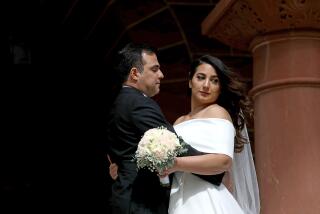Taking the Gamble Out of Vegas Weddings
- Share via
LAS VEGAS — Love-struck couples will soon have greater confidence that after marching into a wedding chapel to say “I do,” they really did.
Tougher Clark County regulations, taking effect Jan. 1, will limit who can be certified to perform marriages.
For the record:
12:00 a.m. Dec. 27, 2000 For the Record
Los Angeles Times Wednesday December 27, 2000 Home Edition Part A Part A Page 3 Metro Desk 1 inches; 29 words Type of Material: Correction
Las Vegas--In Monday’s Times, a photo caption accompanying a story on Las Vegas weddings failed to state that the ceremony pictured with Ron Rogers presiding took place at the Viva Las Vegas Wedding Chapel.
Even if the minister is dressed in a white-sequined Elvis jumpsuit--but has a county certificate confirming he’s a marrying man--rest assured he is indeed an active or retired minister of an actual congregation and has passed a police background check.
The same can’t be said in California, where couples can be--and have been--married by officiants who possess nothing more than a minister’s identification card obtained by mail order.
“That’s exactly what we don’t want happening here,” said Clark County clerk Shirley Parraguirre.
Nevada state law requires that people be married by bona fide ministers, civil marriage commissioners in a county clerk’s office, judges or justices of the peace.
Clark County officials, in an effort to protect the reputation of Las Vegas, want to make sure that wedding chapel officiants really are ministers who know how to complete all the necessary paperwork, and are not recent felons or con artists looking to make a quick buck in the local wedding industry, which grosses more than $10 million a year.
“In the past, we’ve had newlyweds go home, and questions would arise if their [ceremonial] wedding certificates were valid,” said Deputy Dist. Atty. Jan Stewart.
“Sometimes, the wedding certificate hadn’t been recorded with the county, and in some cases, the people who were performing the ceremony weren’t ministers--or didn’t even live here.”
To perform weddings, a minister must swear he or she is an active or retired minister of a congregation with at least 20 adult members who meet at least weekly. The group must have a physical meeting place and be officially recognized by the state. And the minister must have a role in his church beyond simply officiating at weddings.
The applicant also must have a superior in his church vouch for him, and agree to a police background check, because state law prohibits people who have been convicted of a felony within 10 years from performing marriages.
Once certified, the minister must renew the paperwork every five years.
More than 100,000 weddings a year are performed in Clark County--the vast majority in Las Vegas. By comparison, about 50,000 weddings are performed in Los Angeles County, according to a supervisor in the county’s birth, death and marriage section.
Under Clark County’s current and more lax regulations--which didn’t define the size of a congregation--about 1,500 people are permitted to perform weddings.
All of them will be required to fill out the new paperwork. It is unknown how many will not qualify under the tougher rules, said Mariah Witt of the county clerk’s office.
If the minister no longer qualifies, an otherwise properly recorded marriage remains legal.
The people who run the wedding chapels on the Strip say they’re fully supportive of the new rules.
“There’s probably 80 chapels in town, and we don’t want people coming here, saying they’re ministers, just to make good money,” said Darlene Christensen, wedding coordinator at the Viva Las Vegas Wedding Chapel, which uses three on-call ministers.
A brief, bare-bones wedding there costs $75 for use of the chapel and $50 for the minister. Weddings featuring an Elvis impersonator start at $150.
“If we didn’t have the county regulations, everyone would want to be a minister,” Christensen said. “At 10 weddings a day, $50 each, you do the math.”
More to Read
Sign up for Essential California
The most important California stories and recommendations in your inbox every morning.
You may occasionally receive promotional content from the Los Angeles Times.










